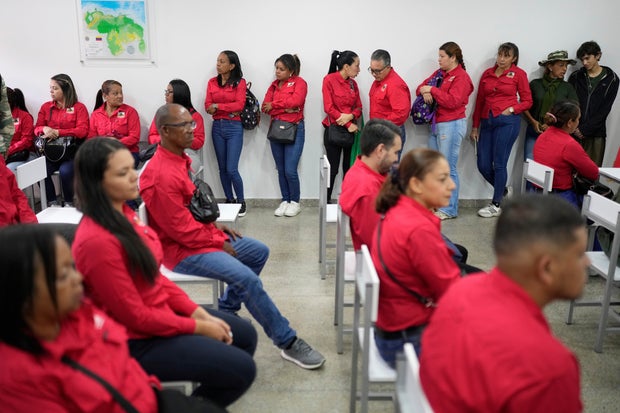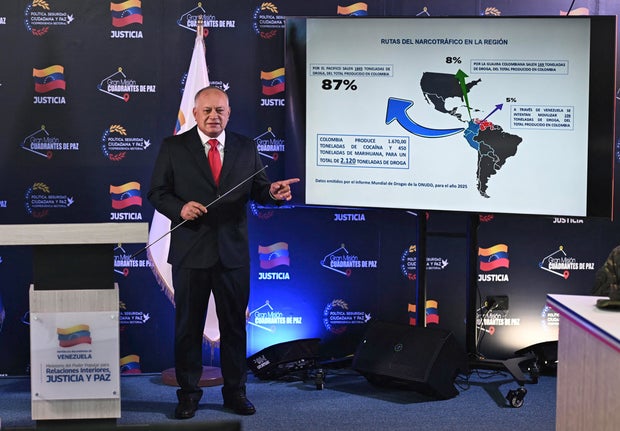Venezuela deploys warships, drones after U.S. sends guided-missile destroyers to region
Venezuela on Tuesday deployed warships and drones to patrol the country's coastline after the United States dispatched three destroyers to the region to pressure strongman President Nicolas Maduro.
In a video on social media, Defense Minister Vladimir Padrino announced a "significant" drone deployment as well as naval patrols along its Caribbean coast, including "larger vessels further north in our territorial waters."
The move comes amid escalating tensions with Washington, which sent three guided-missile destoyers and 4,000 Marines towards Venezuela last week to curb drug trafficking.
On Tuesday, a U.S. source told AFP that President Donald Trump was dispatching two more ships to the Caribbean to crack down on drug cartels.
A guided missile cruiser, the USS Erie, and a nuclear-powered fast attack submarine, the USS Newport News, are due in the region next week, the source familiar with the move told AFP on condition of anonymity.
Despite the dramatic military build-up, analysts have downplayed the possibility of a U.S. invasion or U.S. strikes on Venezuela.
On the streets of Venezuela, many people also shrugged off the threat as posturing.
Maduro, who claimed a third term in July 2024 elections marred by fraud allegations and a crackdown on the opposition, has been in Mr. Trump's sights ever since the Republic's first term in office, from 2017 to 2021.
But his policy of maximum pressure on Venezuela, including an oil embargo still in effect, failed to dislodge Maduro from power.
"I think what we're seeing represents an attempt to create anxiety in government circles and force Maduro to negotiate something," International Crisis Group analyst Phil Gunson told AFP.
Since returning to power in January, Mr. Trump's attacks on Venezuela have focused chiefly on the activities of the South American country's powerful transnational gangs.
Washington accuses Maduro of heading a cocaine trafficking cartel, Cartel de los Soles, which the Trump administration has designated a terrorist organization.
The United States recently doubled its bounty to $50 million in exchange for Maduro's capture to face drug charges. Last year, the U.S. seized a plane belonging to Maduro and brought it to the U.S., with the Justice Department claiming the jet was exported from Florida in violation of U.S. sanctions.
"Outlandish threats"Maduro has accused Mr. Trump of attempting to effect regime change and launched a drive to sign up thousands of militia members. Thousands of civil servants, housewives and retirees lined up in Venezuela's capital over the weekend to join the country's militia after Maduro called on citizens to respond to "outlandish threats" by the U.S.
On Tuesday, Caracas petitioned the United Nations to intervene in the dispute by demanding "the immediate cessation of the U.S. military deployment in the Caribbean."
Venezuela on Monday announced the deployment of 15,000 troops to the Colombia border to fight drug trafficking.
"Venezuela is a clean territory, free of drug trafficking," Maduro said in his weekly television program. "...free from coca leaf crops, free! Free from cocaine production."
Interior Minister Diosdado Cabello announced that the government was deploying the troops to bolster security in Zulia and Tachira states, which border Colombia.
"Here, we do fight drug trafficking, here, we do fight drug cartels on all fronts," he added, announcing the seizure of 53 tons of drugs so far this year.
In a separate announcement Tuesday, Defense Minister Padrino said an ongoing operation in Venezuela's northeastern corner had resulted in the dismantling of shipyards where criminals intended "to manufacture semisubmersibles and boats to transport drugs by sea" to markets in Europe and North America.
Semisubmersible vessels -- known as "narco subs" -- cannot go fully underwater but are popular among international drug traffickers as they can sometimes elude detection by law enforcement. The vessels are often spotted in Colombian waters while heading to the United States, Central America and Europe.
The Associated Press contributed to this report.
More from CBS News

